

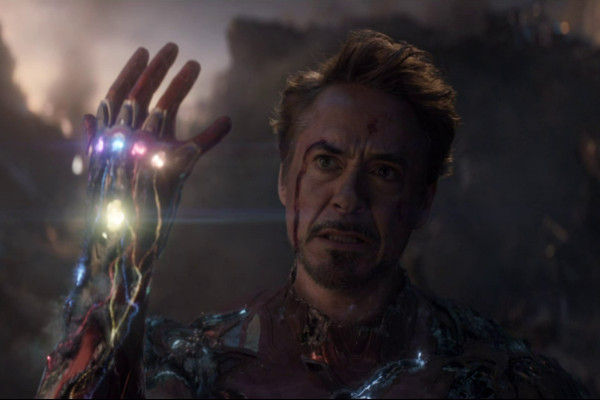
Initially ranked in eighth place, Endgame took a huge tumble on second viewing, illustrating that not only does it lack true rewatch value, but also that watching these movies more than once isn't really good for you. The MCU was tackled here at The Anorak Zone in a shameless attempt for views, and it's maybe regrettable when the movies get this mundane.
The film perfectly highlights the fundamental problems with the franchise: it's a much slower film than many would have expected, which would be fine if it had three dimensional characters in it. But pretty much all of the Marvel characters are interchangeable meta machines, two dimensional quipsters who constantly deconstruct everything around them. It's fine for the characters to constantly reflect on how silly it all is, but expecting the viewers to then sympathise/care/cry about cardboard characters who go around spouting platitudes is too much. Scarlett Johannson seems to struggle the most with the material, where every trite line is required to be delivered as if the cast are performing Chekov.
This is one of the sillier, more grating entries, where the "humour" is so broad and overt it almost actively insults the audience. It's an odd state of affairs, really... a film that's too childish to genuinely appeal to a sophisticated adult audience, but full of inappropriate violence and mild bad language so that the age range that could really enjoy it (under 5s) don't get a pure family movie. One minute we're watching string-accentuated bombast doused in smug self-congratulation, the next pure "yuks" with cartoonish humour. As a celebration of ten years of Marvel movies, it perhaps sums up the overall experience quite adequately.
Yet there's people out there who take this stuff seriously, as if they're watching an actual developed movie. An article in The Guardian talked about Thor having mental health issues and the "fat shaming" of the character. Such moments can only come with realistically developed characters, played with nuance. Watching Chris Hemsworth shamelessly mugging in a fat suit and then having a journalist saying he's suffering from "PTSD" is like watching Pixie and Dixie and claiming Mr. Jinks hates "meeces" to "pieces" simply as a byproduct of clinical depression.
Dragging on relentlessly for three hours, it presents some colossal plot holes, not least how it gives us a Thanos killed in a timeline before the events of the first movie. With an almost $2.8 billion haul, it became temporarily the highest grossing film of all time. The film that it beat (Avatar) was a decade old and so would, if inflation were factored in, still be a bigger hit, and in fact retook the honours a few months later. Yet if this equation was done then Gone With The Wind would be a bigger hit than either of them. And, besides... box office never dictated a good movie.

There's a certain arbitrary feel to the first Thor movie, a collection of formulaic elements crowbarred into place without any undue drama or urgency. While a fine introductory film for the superhero, it feels more like a chapter to introduce Avengers characters rather than a film in its own right. It would help if the romance between Thor and Jane Foster had any semblance of reality, but it's all buried beneath somewhat obvious humour, making Ragnarok, in hindsight, less out-of-the-ordinary than it first appeared. One of Marvel's more fantastical characters, it seemed as if the producers didn't have faith in bringing the Thunder God to screen without a level of irony, though despite such detractions, the film works well as passable entertainment, a collection of green screen spectacles in search of a true narrative.
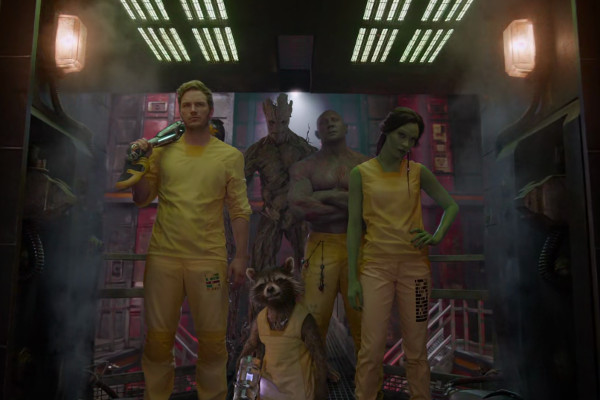
The more "cosmic" side of Marvel is arguably an area where the comic book publisher is less successful... even wild, star-spanning creations like Galactus and the Silver Surfer only really work when they're in Earth's orbit. Consequently it's a sensible move to fully introduce this element of its world by encasing it in comedy, a move which enabled it to cross over to mainstream audiences and become a sizeable hit. Whereas heroes like Iron Man and Thor were not as well-known to the general public as Spider-Man, the Hulk, or many of the rival DC characters, Guardians of the Galaxy took this a stage further by taking characters almost completely obscure and elevating them into cinematic A-Listers.
Yet while sufficiently engaging and containing enough charm to get by, there's no real element of humour in Guardians that doesn't appeal solely to the lowest common denominator. A rude Jackson Pollock joke aside, this is a film content to appeal to as many people as possible, with glib, "easy" humour that never threatens to tax its popcorn-chomping audience. It's a much-loved Marvel movie by many, and no one would ever expect Marvel to adopt Wildean wit as part of its arsenal, but it's not a favourite here.
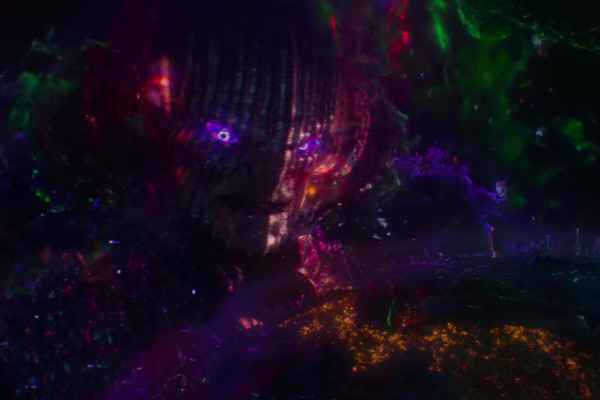
Doctor Strange is a decent entry in the Marvel Cinematic Universe, and Benedict Cumberbatch, while not particularly imaginative casting, brings together one of the better performances of a Marvel hero. However, there's the constant signs of the character being slotted into the "product" framework, rather than the film being slotted around the core character. While Dr. Strange began as a very arrogant surgeon, he wasn't the quip-a-minute Tony Stark xerox that's sometimes presented here, as the wacky hi-jinks featuring a cloak with a mind of its own go against the surrealistic, darker and downright odd moments of the comic book.
This is Dr. Strange by the way of Inception, not a true representation of the comicbook on screen, and the climax does strain towards green screen overload. The use of mild bad language in Marvel films is also always slightly troubling considering how many younger fans they attract, but if ever a Marvel character didn't need a couple of "assholes", "shits" and a "bullshit", it's Dr. Strange. While these films exist to make money more than they ever exist to make art, the somewhat cynical recreation of one of Marvel's more esoteric, aloof characters into standard Hollywood fare can't help but be troubling. A character like Dr. Strange should be an original, not following a carefully formulaic path laden by others. Dr. Strange is a okayish, maybe even good film, but it could, and should, have been a great one.
The film also brings up the subject of race-swapping characters. Although there are instances of Marvel characters being changed to minorities onscreen (perhaps most famously with Johnny Storm in a 2015 Fox Fantastic Four movie, along with pretty much every single character in Spider-Man: Homecoming, but also here, with Baron Mordo played by Chiwetel Ejiofor) this is not generally regarded as being a bad thing as minorities are underrepresented onscreen. However, the opposite also occurs here, with the male Tibetan Ancient One of the comics being played by Tilda Swinton. Such matters are perhaps too complex to go into in any great detail in a short overview, though the oddest example of race swapping in a Marvel movie arguably occurs in Thor: The Dark World, which presents audiences with a black elf.
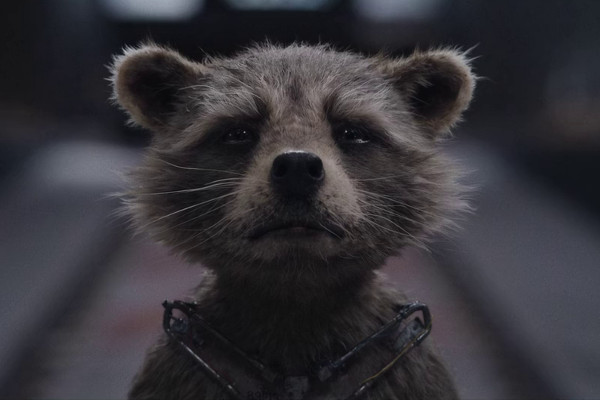
A very tonally odd film, as an unnecessarily violent exploration of vivisection meets humour that wouldn't amuse anyone above the age of ten years old. It's symptomatic of the entire problem with the MCU, in that the films are pushed towards a 12A rating by unneeded graphic content, including swearing, yet only contain humour that the children too young to see them would appreciate.
To go forward, Marvel either has to get back on board with something more family-friendly, or have humour a little more sophisticated than just putting "Drax says something dumb" into the script. There's also concern over the increased usage of CGI over recent Marvel films, escalated to such an extent that it's layer upon layers of unreal imagery.
If all this sounds negative, then this is still a watchable (albeit overlong) film. The combination of glibness and overtly sentimental platitudes can grate, but RSC actor Chukwudi Iwuji details a fine performance as the High Evolutionary. It's just a shame that so many of Marvel's wilder concepts are thrown away on "humour", with the intriguing possibilities of Counter Earth just delivered as for cheap laughs.
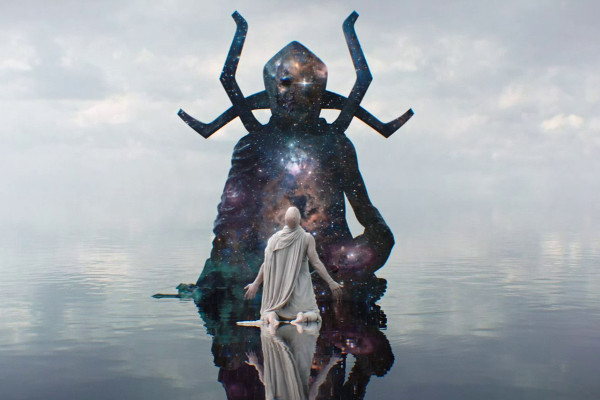
There's definitely bits to pick out and enjoy in Thor: Love and Thunder, but the problem is, it's two films bolted together. The tale of a man driven insane by the death of his infant daughter and Jane Foster dying of terminal cancer, it's a bad mix with Taika Waititi's hi jinks attitude to the franchise. In particular, Hemsworth's increasingly wearying "himbo" version of Thor is even more ridiculous when he gets back together his astrophysicist girlfriend, highlighting how truly silly the "I'm not very bright, ha ha" joke version of the Thunder God is.
So, it's a bit of a mess, though does have slightly more purpose than the trailer (which contains scenes not in the finished movie) seemed to suggest. Christian Bale manages to straddle the line between his usual intensity and Marvel's more... "operatic" (or, if you will, hammy) excesses. The somewhat esoteric character of Eternity is left even more unexplained than it ever was in the comics, and it's a tonal mess, but somewhere in there is maybe half a decent film...
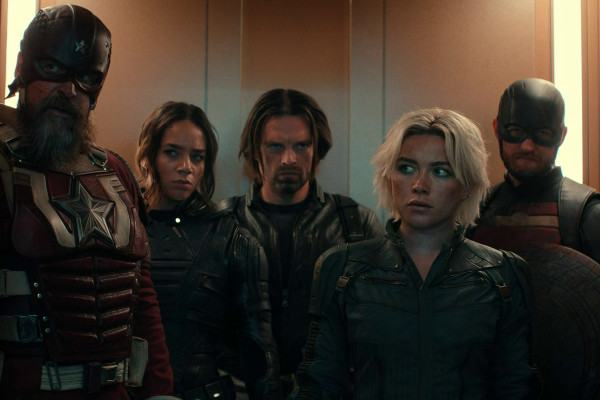
One of the more interesting of the later Marvel movies, Thunderbolts* (yes, the asterisk is part of the title, reason placed under the hidden text on the image) struggled to find an audience despite good reviews. Making a box office of just $382 million against a $180 million budget, it would have lost money when the cinema cut and marketing were factored in. It's a shame, because it certainly begins as a decent enough movie, with some lower scale anti-heroes placed together in a trap and needing to work together to escape.
There's again the recently recurring problem with films serving the TV shows rather than vice versa, so we get a character, US Agent, who appeared in The Falcon and the Winter Soldier TV series and none of the movies. However, the film does a decent job of introducing everyone, so you don't particularly feel that you need to have done your homework before seeing it.
The second half of the movie - with the newly-formed team banding together to stop a threat - does start to crumble slightly under the trademark "humour" of Marvel, and the Westernised vision of two Russian characters does stretch credulity, even if it's just wondering why they'd use the term "soccer". But there's some intriguing stuff there, with an antagonist that doesn't so much physically attack his enemies, but places them into a world where they're defeated psychologically.
Of course, having Marvel characters undergoing psychological torments is a bit like watching a film about Top Cat in therapy. Despite the best efforts of everyone involved, most of the MCU characters are less three-dimensional than their counterparts on the printed page, so it doesn't totally come off. But it's a fair effort at trying something a little bit different, and worth a look.